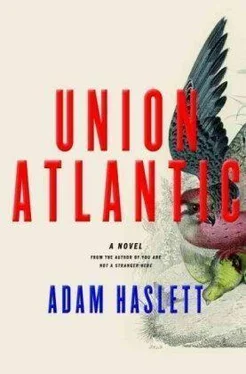“Glenda’s gone too far this time,” a silver-haired lady in front of her said to her husband, as security guards body-scanned each invitee with their metal-detecting wands. “Who does she think we are? Militants?”
“Believe me,” the man ahead of her said, “there are people out there planning things. This here makes a good deal of sense.” Evelyn recognized him from the newspaper: the head of State Street, lately plagued by kidnapping threats. Farther along, various bank employees and their spouses feasted their eyes on the chairman’s estate, unfazed by the precautions. She supposed she was one of the few who wondered if she’d be allowed to pass. But they did let her through and she proceeded along the path to a set of long folding tables staffed by a team of severe-looking, young blond women who wielded their pens and clipboards like guardians of an auction for qualified buyers only, ready in an instant to lose those winning, welcoming smiles and halt the riffraff in their tracks. One of them beamed an extra beam as she checked Evelyn’s name off the list and handed her a place card, her visage replete with that secret liberal pleasure of being given the chance to be kind and nondiscriminatory to a black person.
Up on the main lawn a waiter in a white jacket, sweat running down his face, offered her a glass from a tray of sparkling wines. Guests had already begun to roll up their sleeves and mop their brows with cocktail napkins. She strolled to the open end of the square formed by the back of the house and the two circus-scale tents and from there looked down the far side of the hill to a pond where several men in a rowboat were making their way toward a floating dock.
She’d known when Fanning routed her an invitation to the party not to expect barbecue in the backyard. But this was something else.
Then again, perhaps this was part of her new station. She was, after all, soon to be a vice president for operations.
Her aunt Verna had nearly fainted with joy at the news. “That’s it,” she’d said. “You go right on, you hear me? You just go right on.” Verna had always been the pragmatist in the family, the survivor. Years ago, when she was a girl, Evelyn had asked her aunt how she managed to stay so thin all these years and she could still remember her saying, “Well, Evey, I’ll tell you my little secret: there’s nothing like good, old-fashioned anger to burn those calories to the ground.”
What would Verna make of all this? Would she hesitate? Would she think it too much?
As soon as Evelyn had received the call from Fanning’s secretary last week saying he wanted to meet, she’d expected a snow job. But a doubling of her salary? A position in management? The only other black woman in the upper ranks of the company was Carolyn Greene, a light-skinned Princeton grad, whose parents had a house on the Vineyard. At Evelyn’s first minority-employee luncheon, Carolyn had asked her whose secretary she was. From the position Fanning had offered her, Evelyn could move to any bank in the country or into another line of business altogether. She could buy the house she’d long been saving for. And about one thing at least Fanning had been right: she would be better at the job than her boss.
You dream of such things with your brother fresh in the grave?
She could hear her mother’s voice. Yes, she thought. I do.
Feeling a trickle of cooler air on her feet, she moved back along the tent’s edge and passed inside. A giant chandelier had been dropped to encircle the main pole. Floral arrangements three feet high, bursting with red and blue, rose from the center of tables still being laid by a crew of waiters.
Nearby an older couple sat facing Evelyn, having taken refuge from the drinks tent opposite. He looked familiar, the gentleman, in his rumpled gray suit, his white hair neatly parted, his hands folded in his lap, a kindly look about him. Where was it, Evelyn wondered, that she had seen him before? And then she remembered. It had been back in the spring at the payment systems conference she’d attended down in Florida. He was the man from the Federal Reserve who had given the keynote address. She remembered it because such things were usually dull as all get-out. But toward the end of his review of the progress in securing commercial payments, this man had taken a step back from the specifics to describe to the audience the importance of their work, reminding them that while the business of keeping money flowing was a technical one, it supported and allowed millions of daily acts from the purchase of food to the paying of rent or salaries or medical bills. “Politicians argue over relative distributions,” he’d said. “The market fiddles with the price of goods and labor. But all of it relies on you. You’re the invisible medium. Not the hand of the market but the conduit. You touch virtually everything you see. Most of you work for private corporations. But the trust, it’s public.”
An old-schooler, she could remember thinking at the time. A man who sounded as if he meant what he said.
His wife — could that be the wife? — caught Evelyn’s eye and smiled at her in a knowing fashion, as if they had just shared in some rarefied private joke.
Before Evelyn could say hello, the gentleman volunteered an apology if they were in her seats; she assured them that they weren’t, explaining briefly about having heard him speak.
“Ah,” he said. “I hope I didn’t bore you. I can become rather self-important at times.”
“That, at least, is the truth,” the woman observed.
“This is my sister, Charlotte.”
“How do you do?”
“All right, I suppose,” she said. “Are you a banker, too?”
“I work for Atlantic Securities.”
“Well then, you’re in good hands,” Mr. Graves said, with an open-faced smile, apparently not the least imposed upon by her approach. “This is quite a gathering,” he added.
“It sure is. Not sure I really fit in,” she said, chastising herself as soon as the words left her mouth. Why should she offer such an admission?
“For which you should count yourself lucky,” Charlotte rejoined.
After Fanning’s visit, Brenda Hilliard from compliance had phoned Evelyn back to ask what the issue was that she had wanted to discuss; Evelyn had prevaricated, saying there had been a mix-up, that the problem had been resolved. She had gone along with Fanning’s scheme. That’s what she had done.
“I didn’t mean to interrupt you both,” she said. “I just wanted to say I enjoyed your talk.”
Mr. Graves smiled again. “You’re very kind to say so. Enjoy the party.”
___________
THROUGH THE FRENZY of the day’s preparations, Nate and the others had sheltered around the Hollands’ pool on the far side of the house. As usual on such idle summer afternoons, they’d gotten high and entertained themselves by playing bring-me-down, a game wherein the last things you wanted to think of while baked were hurled at you by your closest friends in an attempt to defeat your buzz. Each attack required retaliation and further bong hits, the whole disordered affair not infrequently bringing Emily to tears — of distress or drugged stupefaction one could never quite tell — while the boys more often resorted to throwing objects or shoving one another into the pool.
As surrogate families went, the four of them were tight-knit, having learned early on the value of ridicule as a means of avoiding the awkwardness of their mutual affection.
The game that day had begun with the minor stuff of yeast infections, poor hygiene, and other bodily insecurities before reaching personal matters — Emily’s retarded cousin, Hal’s inability to attract girls. And it might have ended there but for the stuff they were smoking. Having failed to graduate, Jason, on Hal’s canny advice, had thrown himself on his parents’ mercy, promised to rededicate himself to studying in the fall, and suggested that what he really needed was the chance to help others for a while. Thus it was that he’d recently returned from his week of Habitat for Humanity — in Jamaica.
Читать дальше












